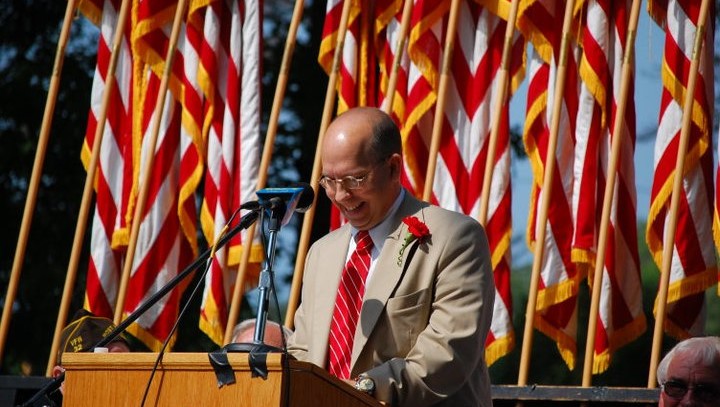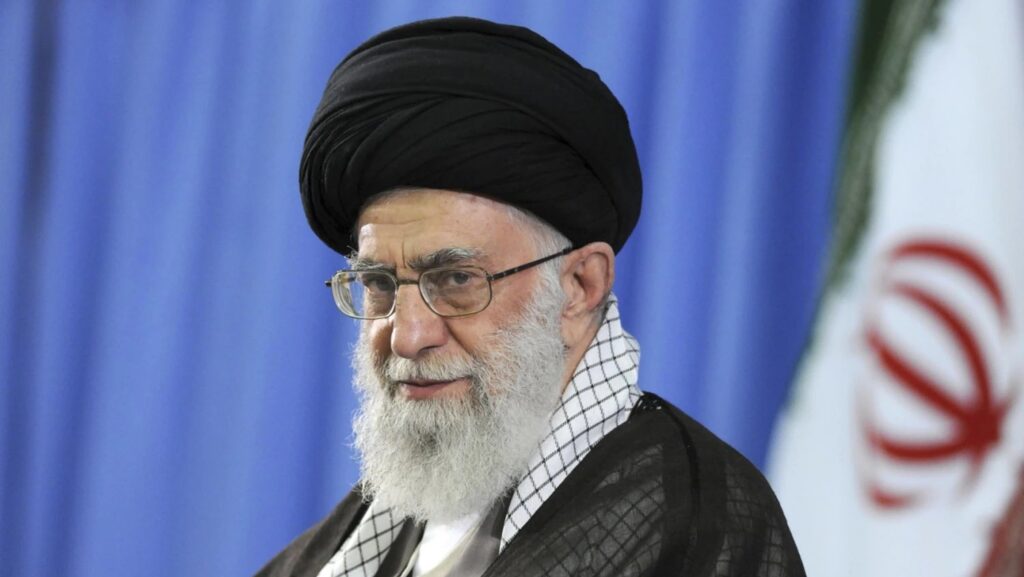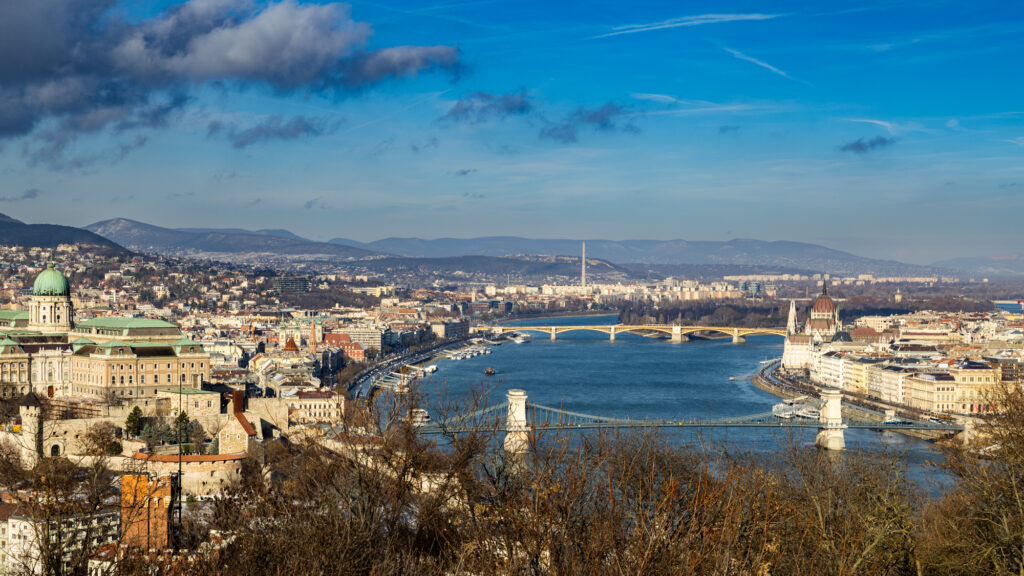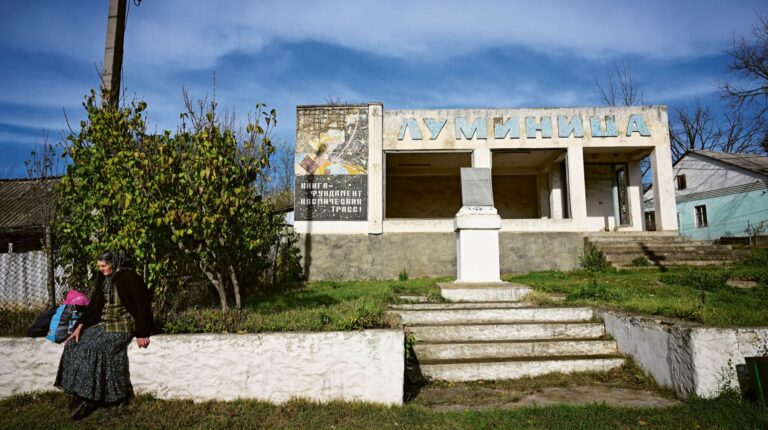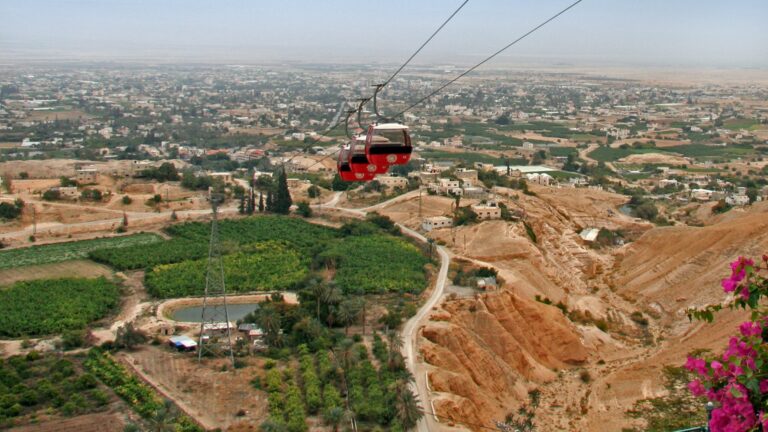Andy Szekely is a fourth-generation Hungarian whose family settled in Lansdale, PA, a Philadelphia suburb, in 1957. He fell in love with Hungary while working there as a teacher between 1993 and 1996. After returning to the U.S., he was enrolled in the Central European Studies Department at Indiana University, studying under Mihály Szegedy-Maszák. He then changed direction and entered his father’s chiropractor business and took up several community roles, including serving as mayor of his hometown for almost ten years. Experiencing dramatic demographic and political changes there, he is currently contemplating moving with his family to Hungary.
***
You have a Hungarian name, and speak quite good Hungarian, which you learned as an adult. What’s your story about your own Hungarian roots?
My great-great-grandfather, György Székely, was born in Nagyszékely, Hungary, in 1855 and died in 1932 in Budapest. My great-grandfather, György Székely (born in 1876 in Nagyszékely and died in 1963 in Hatboro, PA) left Hungary in 1901. His half-brother, László Székely, was a major general of the Hungarian army during World War II and was sentenced to death after the war. He escaped and came to the United States in 1947. My grandfather, George John Szekely (born in 1906, in Edison, New Jersey and died in 1977 in Lansdale, PA) didn’t speak much Hungarian and died when I was relatively young, so neither my father, George Andrew Szekely (born in 1934 in Camden, New Jersey and died in 2014 in Lansdale), nor me, George Andrew Szekely II (born in 1970, in Lansdale) knew any Hungarian. I’m thus the fifth George Szekely, albeit with a few modifications; still, I grew up not knowing anything about Hungary other than where it was on the map. After college, in 1993, I was working at a bar in Washington, D.C., and was looking for a proper job when I met some Hungarian diplomats who were actively looking for native English teachers. I immediately said yes, and I ended up at Horváth Mihály Gymnasium (High School) in Szentes, Hungary, as an employee of the Department of Education in Hungary, where I was treated almost as a regular teacher. I stayed there for three years. That’s how I started to learn about my Hungarian heritage as a young adult, at the age of 23.
You said you fell in love with Hungary. What attracted you to the country?
It was like going back in time: you’d see horses and carriages bringing the produce in from the countryside. The manners were very different from what I was used to in the U.S. There was much more emphasis on history, literature, and on culture in general, whereas here in America, everything is very much driven by finance dictating social status. I loved to read Dezső Kosztolányi’s Pacsirta, Géza Gárdonyi’s Egri Csillagok; I liked the architecture and fell in love with classical music while the local music school offered free concerts for teachers. People were so welcoming, even if they didn’t speak too much English—or at all. I could eat out every day of the week with various families who often invited me to stay with them for a couple of nights. It was wonderful living in Szentes for three years. My wife, Szilvia, is from Mindszent, an even smaller town, right on the banks of the Tisza river—we travel there every year with our daughters to see her family.
How did you meet your wife? Was she happy to move to the U.S. with you?
She was a university student teaching at the same high school. I might have stayed longer in Hungary, but my mother was sick at the time, so I returned after three years. Before that, my American colleague and I, who had been in Szentes for two years prior to me getting there—and who actually still lives there—organized a trip for 10 high school students for three weeks traveling throughout the East Coast from Washington, D.C. up to Massachusetts. The local newspaper reported on the visit, and I remember they mentioned the fact that sliced bread was different from what they were used to, and there were lots of American flags everywhere, which was strange for them. Since eight out of the ten students were female, Szilvia came as a chaperone for the girls. She ended up staying here because she found a job as a nanny in New York, while I returned to Pennsylvania. We were dating, then it got more and more serious, and ultimately we ended up getting married both here and in Mindszent, Hungary, in 1999. We settled in Lansdale, PA, a suburb 28 miles northwest of Philadelphia, where my family moved and where my father started a chiropractic practice in 1957. Our first daughter, Anna, was born in 2008, followed by Emma in 2012.
Your hometown is close to the Magyar Tanya in Barto, PA, and several of its founders lived in Lansdale…Do you know them? Have you been there?
In my childhood, I didn’t even know the Magyar Tanya existed…Our family spoke no Hungarian, so there wasn’t such a need for connection to other Hungarians, like for the 56ers who arrived later and in larger numbers. They had a unity for themselves, whereas we were beyond that, I guess. When I came back from Hungary, I was very enthusiastic and went to two different Hungarian clubs. At the Magyar Tanya, I offered my help, but they weren’t that interested because my Hungarian wasn’t so good, or because I didn’t have the same background as a 56er, I was kind of blown off or pushed to the side. The same happened at the Hungarian Club in Philadelphia. They were having a lot of internal arguments, which seemed to me like a big family dispute, which I wasn’t interested in. Nevertheless, we visited Magyar Tanya a couple of times. When we were there, my wife and I talked in Hungarian to others, but our children, like most of the kids here, spoke English…
How do you help your daughters embrace their Hungarian identity?
When we married, our intention was to certainly teach our two children about Hungarian culture, literature, and language, but it has been a bit of a struggle, especially the language. However, lately we have been more and more into it. I’ve just lately read in your book series, Being Hungarian in America, that a lot of the Hungarians who settled on the East Coast, Ohio, New Jersey, New York, were very strict with or insistent about having their children learn the Hungarian language and culture. We haven’t done that, just a little bit here and there. My wife speaks perfect English; she teaches English as a second language (ESL) and is an administrator for a nonprofit corporation. I have a huge family; I’m one of six children, and I have lots of nieces and nephews, but I’m the only one who has any knowledge of Hungarian, so during family gatherings everything’s in English. And due to the large family and frequent gatherings, we didn’t have time for regular visits to Magyar Tanya, Hungarian weekend school, or scouting. Looking back, if I could have changed things, maybe we’d have explored scouts a little bit more on the weekends at the Magyar Tanya. Unfortunately, my family is all dispersed now; my parents are gone, my sisters and their families have moved away, with only a few of them still around.
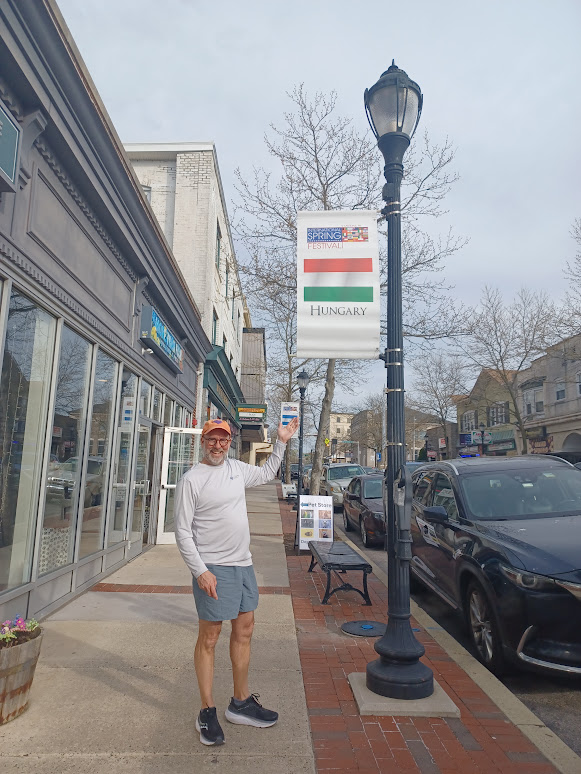
Nevertheless, it’s very important for me that my daughters learn Hungarian, so that they can speak to my wife’s mother and her family. If you talk to any person in America whose parents were from, let’s say, Italy, and they don’t speak Italian, the one thing they’d always say is that they wish their mother had made them learn Italian. So, we’re getting there—slowly and a little bit later, but I think that each year when we go back to Hungary, it’s almost like a light that gets brighter and brighter for my daughters, because they appreciate more and more how wonderful Budapest or Mindszent are. It’s still like going back in time: they have bicycles they use without helmets to ride to Tisza, my mother-in-law raises chickens—it’s a very wholesome and healthy lifestyle.
You said to preserve the language and culture, you have to go back to Hungary…Please explain.
Our daughters get the most out of their Hungarian identity when we go back to Hungary for two weeks every year. We spend it mainly with grandma, who speaks no English, and neither does my wife’s sister or brother-in-law. However, their children speak English. We spend most of our days on the bank of the Tisza River, at the beach. Relationships and language skills increase exponentially during the two weeks while we’re in Hungary. Thus, they recently became interested in summer camps in Hungary, and our older daughter, who is a sophomore now in high school, is very interested in applying for a full four-year university scholarship to Hungary. She’s been playing the violin since kindergarten, so we’re trying to pinpoint what her interest would be while in Hungary that she could then bring back here to the United States.
You’ve also mentioned moving to Hungary for good. Is this a viable plan?
I’d say that there’s a lot of ‘if’s’ in this plan, and I’ll never cut my ties to America, but it’s definitely my intention to spend at least more time in Hungary. Not only because of my family’s Hungarian roots, but also because my hometown has changed drastically in the last few decades. I was a mayor in Lansdale from 2008 for nine and a half years and had other relevant community roles, while I’ve experienced very strange and irreversible developments. At this point, our discussion might get a little political…By now, Lansdale has a 20 per cent Muslim population with two mosques, and this change has happened very quickly, in about 30 years since the first Bangladeshi families arrived in the late 80s–early 90s. In the school district, which encompasses a larger geographic area than Lansdale, the demographic is 41 per cent minorities, primarily Southeast Asians, according to Public School Review. Perplexingly, the Bangladeshi Muslims are religious conservatives, but they vote overwhelmingly Democratic in anticipation of favors such as zoning relief and positions on different committees, such as the Planning Commission. Most recently, they have marched in town in support of Palestine and denouncing Israel…So, lately, we had to deal with what Rod Dreher and others often refer to as Islamic leftism.
‘So, lately, we had to deal with what Rod Dreher and others often refer to as Islamic leftism’
Moreover, because of surging immigration numbers, the physical geography of our region has also changed. In one township, where my parents had a farm, the population surged 60 per cent from 1990 to 2000 with the suburban development of many surrounding farms. It has changed the character and the beauty of the region. These sprawling developments dilute the rural, agrarian nature of the community, which is often the bearer of the local customs and traditions. And I have seen how those newer inhabitants—and many from the city of Philadelphia—bring their liberal politics with them. I remember being in Szeged, Hungary, in 2015 when tens of thousands of illegal migrants crossed the border within weeks. It was apparent that in such a small country, the local population could be overrun relatively quickly and easily. That’s when I made a video, which gained some attention and several comments praising it amongst Hungarians.
Before going further, how and why did you become a mayor?
When I came back from Hungary in 1996, I enrolled in the Central European Studies Department at Indiana University, studying under Mihály Szegedy-Maszák. Then I changed direction. My mother was dying at the time, and I didn’t want to be traveling all over, so I accepted my father’s invitation into his business. I went back to school and became a chiropractor in 2000. In the suburbs in America, it’s increasingly rare for one family to stay in one place for any length of time, let alone continue a family business in healthcare for close to 70 years. As a small business owner, I had to become involved in the local community through the Rotary Club, the Visiting Nurses Association, the local symphony orchestra—I can’t play any music, but I became its president, because I love classical music and was good at fundraising—and the Chamber of Commerce, just to name a few. I had name recognition, and I was a good, upstanding member of the community. Thus, in 2008, I was appointed mayor, then elected in 2009 and also re-elected in 2013.
Why did I accept it? Because I thought I’d have good stationery. (laughs) Because I wanted to do something good for the town. I had a very flexible schedule as a chiropractor and thus was able to devote a significant amount of time to the community. During my tenure, I served them with distinction and without controversy. My aspiration was to be a boring, respectable bourgeois citizen. I managed to bring in a couple of businesses, even one called Boardroom Spirits, whose distilling equipment came from a company called Hagyo Kft., based out of Miskolc. They are the first distillery opened in North America with Hungarian equipment and one of only a few that make pálinka in the U.S.—although they can’t call it pálinka here because it can only be called so if it’s made in Hungary.
What was your main goal as a mayor?
In the back of my mind, I always had Szentes and other lovely Hungarian small towns such as Sopron or Kőszeg as examples. Lansdale has 18,000 inhabitants, while Szentes has 25,000 inhabitants. I wanted to bring a little bit of what is not only a Hungarian, but perhaps a European phenomenon: a walkable downtown with shops, a downtown that’s alive. But, unfortunately, the town was undergoing some changes, and I had to realize that my plan was not going to work. When the first malls came in, they took the foot traffic away from downtowns across America. Later, there was a little bit of a renaissance of small towns, but now, between COVID and Amazon, they’re struggling again. I don’t know if the same thing is happening in small towns in Hungary, but Szentes and Mindszent are still very much alive. The homogeneity of the culture, the curriculum kids learn in school about Hungarian writers, poets, musicians, and artists, is a very solid rock. Here, because of our much shorter history and political correctness, everything is different. It was just relayed to me yesterday that within the school district, there are 64 different languages spoken. So, a combination of the move to the left politically, the 20 per cent Muslim population in town, the left-leaning school board with LGBTQ and CRT (critical race theory) agenda has changed the community significantly and not for the better. I know that’s also happening in Hungary, to a greater extent in Budapest and less in smaller towns, but I think in the long term, Hungary has a brighter future.
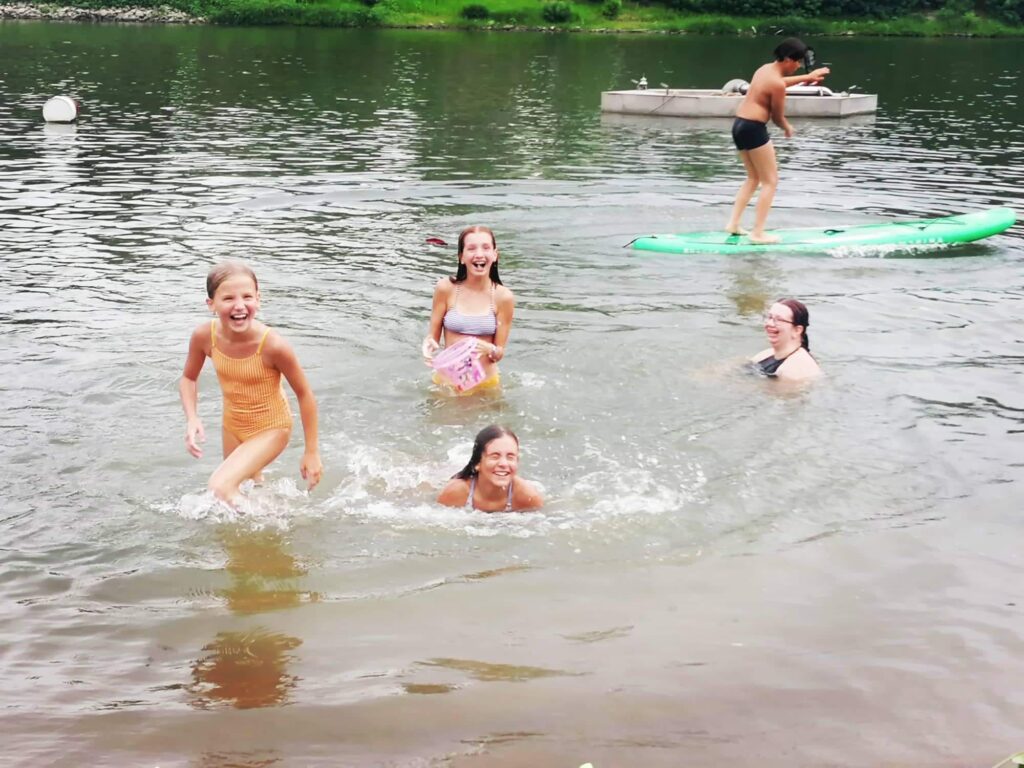
Could you please give some examples of why diversity didn’t work?
With so many different cultures, we have less and less in common. Diversity could be interesting and inspiring up to a point, but the lack of a common history could easily lead to the lack of a common future. For example, I live on a wonderful block with seven houses on each side of the street. Prior to 2016, my neighborhood in particular was very tight-knit; we used to get together once a month, when we’d close off the street and have parties in the middle of the street, and we enjoyed a carefree camaraderie. Those days are over—partly because of COVID, partly because of politics.
Another example: I’ve had a co-worker with whom we couldn’t even agree on the Constitution. He says that it was written by a bunch of white guys who didn’t represent blacks, etc., who at that time were not considered citizens, so how can the Constitution be treated as a document written by great men? We’re in trouble when looking at our 250 years of history. I’d love to see or enter into a debate with someone regarding the different interpretations of your Hungarian 1,100-year-old history, in which you’ve had blood and soil, a true connection to the country, and the geography of Hungary. I wonder, could someone from another country who came and learned the language lately become the prime minister of Hungary? I think it’d be very difficult. Whereas here in America, we had Obama and members of Congress from different countries, such as Ilhan Omar from Somalia—I wonder whether her allegiance is to America or to Somalia? Those are questions I think Americans are going to have to wrestle with now and in the future. Coming back to the Constitution, the U.S. was founded on a belief in a creed. Anyone who came here and said they believed in the Constitution and recognized its history could become an American citizen. But now there are, at least from what I’ve seen at the local level, people who even refuse to recognize the American flag, saying that it’s a ‘trigger’.
‘Now there are…people who even refuse to recognize the American flag, saying that it’s a “trigger”’
Why did you lose the mayoral election in 2017?
Lansdale’s elected officials had been all Republican until 2006 when the first Democrat in decades was elected. Changing demographics in each subsequent election cycle allowed the Democrats to secure a couple of seats until I was the last Republican on Council in 2017…The political climate completely changed in 2016 with the election of Donald Trump. I was up for re-election also in 2017. In order to win, and because the town had changed so quickly, I needed Democrats’ support, too. But because Trump was elected in 2016, Democrats said: ‘We like you, but we have to send a message.’ That’s how I lost the election to a ‘carpetbagger’ from New York who had only lived in Lansdale for a little over a year—basically as a protest against President Trump. And since he was re-elected in 2024, things have gotten even worse, at least in my area…
How? Can you give any examples?
In 2024, my town voted for Kamala Harris over Donald Trump, 63 per cent to 37 per cent—as did pretty much the entire county. Pennsylvania voted for Donald Trump the first time in 2016, then in 2020 voted for Joe Biden. In 2024, it voted back for Trump, while the East Coast, e.g., Washington, Philadelphia, New York, Boston, and New Jersey, are all very Democrat. In Philadelphia, 75 per cent are Democrats, and only 11 per cent are Republicans, and the rest are Independents. Since Trump has been elected, the left has dug in their heels even more. The perfect examples for this are the protests. It’s been six months since he was re-elected, but we’ve had several protests in town. My town is mainly Democrat anyway, so I really don’t understand the need for these. When it was rumored that Immigration Control Enforcement (ICE) agents came to Lansdale, people were saying: ‘Let’s go find them and puncture their tires and damage their cars.’ People are also hanging flags upside down as a measure of protest…The anger on social media has certainly increased since the reelection.
Any chance for you to be reelected as mayor?
I’ve been asked every election cycle, but considering the recent developments, there’s no chance that I’d become elected. Nevertheless, I keep continuing with my message: a lot of what has happened nationally has also happened at the smallest local level that I’ve never really imagined could happen in our town. When we talk about immigration, LGBTQ, or CRT matters, there are still several Hungarians who claim that we can’t have that. I’ve seen what these have done in my small town, but when I went to CPAC Hungary for the first time and was talking to native Budapestians, they couldn’t believe it. When I tell some of these stories to my close relatives, I sometimes even feel they think I’m lying…
Could you tell us some specific stories they couldn’t believe?
Sure. When I was the mayor, one of my duties was to perform a wedding ceremony. I did over 200 ceremonies. In 2013, there was a county administrator who started giving illegal same-sex marriage certificates to the residents of the community. So, my neighbors, a same sex couple, asked me if I could do their wedding. I replied: ‘It’s illegal, so I can’t do it…yet.’ Still, it made the local news with them calling me a coward…
With a complete Democratic majority not only in Lansdale’s Borough Council but also on the local school board and at the county government level, the worst aspects of progressive leftist policies were implemented. In January of 2019, a trans-female whose stage name is Annie Christ read as a drag queen at the Lansdale library with the full approval of the Democratic Council. Can you imagine the affront to Christians in the community? Now she is working in the local school district as a technology support person.
Speaking of the school district, the school board has fully embraced CRT and the LGBTQ agenda. In May 2021, one local elementary school teacher had fifth graders (ages ten to 11) participate in a ‘Diversity Walk’ which separates the children based on race, gender, and socioeconomic status. Critics of this were called ‘white supremacists’. In October of 2021, in the same elementary school, the homoerotic book, All Boys Aren’t Blue by George Johnson, was an approved book in the school library. Parents were criticizing the book at a school board meeting, but what was tragically comical is that the local newspaper couldn’t accurately report on the book because of pornography laws. As part of my community involvement as the mayor of Lansdale, in 2012, I was appointed to a position at the county government level: Montgomery County Prison Board Member. I served competently, and after five years, I was elected president of the prison board by my peers for five consecutive years. My tenure came to an end in 2022 when the leftist county commissioners refused to reappoint me—even though I was elected five times unanimously as president—because I supported the prison warden and staff and their position refusing to allow transgenders to be housed with the gender that they identified with and not their biological gender. I was replaced on the board with an African American who had been convicted of first-degree murder and served his time of 32 years in prison, and nine months later was charged with 92 counts of forgery, theft by deception, and conspiracy to steal COVID funds….
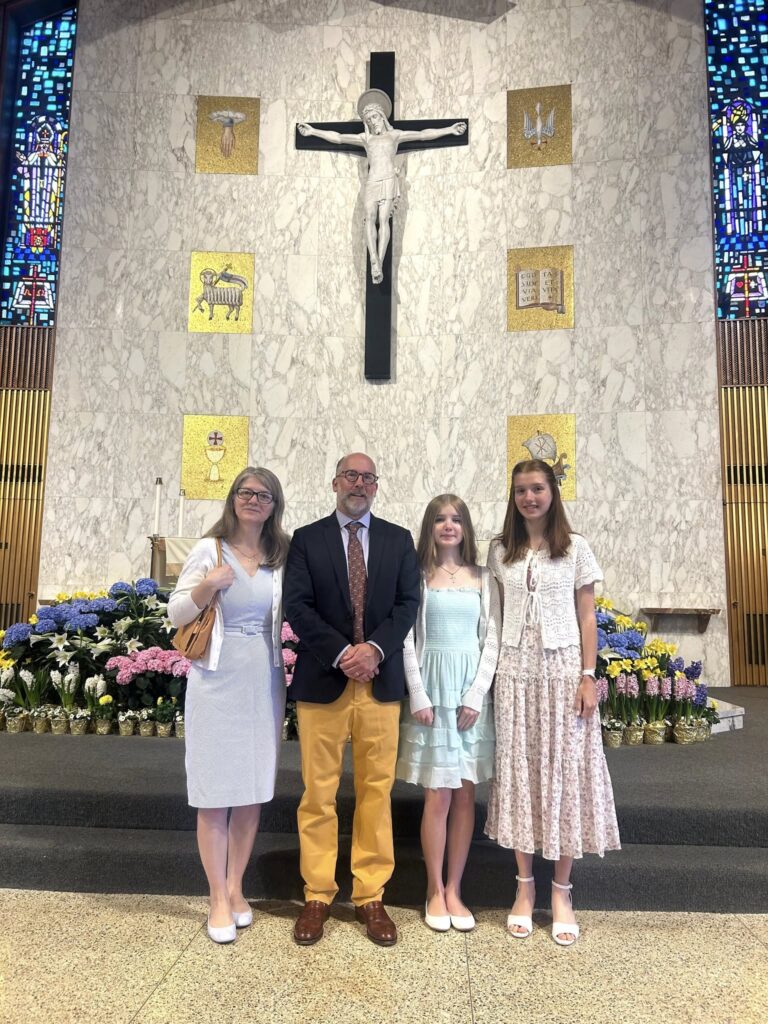
You are a Christian, a conservative, and a Republican. Why?
That’s a good question because I grew up as a nothing. I was baptized in the Methodist church, but never went to church except for weddings. However, I started to see some of these previously mentioned crazies, especially when my first daughter was born and I started to think that my children would need some structure. I also fell in love with classical music, though I didn’t grow up with any classical music. Bach, Beethoven, and Dvořák all had their roots in Christianity. I went through the adult Catholic education classes and was confirmed into the Catholic church at Pentecost of 2017. Both of our daughters have been baptized in the Catholic Church after attending prep classes for several years. During this period, we could see that there was a tremendous resurgence in church attendance: five years ago, when our first daughter entered the Catholic education classes, there were only 40 families; now there are 150. Rod Dreher also wrote about the attendance for Ash Wednesday in France: numbers were going through the roof. The Latin masses we attend once a month are packed; if we don’t get there 15 minutes early, we’re standing in the back. I think people are trying to put their fingers on what is causing this. There is a move back to Christianity, but I think it’s part of what’s going on in the world…
What about being a Republican?
I’d say it goes somewhat hand in hand with Christianity, although not always. My father was a small business owner working hard, wanting to make sure that he kept as much money as he could through lower taxes. What else? I’d say because of traditional family and pro-life values. The standard Republican answer is I’m against the abortion except in the cases of rape, incest and health of the mother. But there was one woman who was running for state representative—when I was also running after being mayor—a black woman, Cathy Barnett. Her mother was raped, but didn’t abort the child, so she is a very powerful speaker. Unfortunately, she didn’t win, but in that regard, we would be on board even with the strictest anti-abortion positions.
Republicans, as well as conservatism, can mean different things. John Lukacs was idiosyncratic in that he was considered a Republican most of the time, but he considered himself what was called a reactionary, but was no fan of Ronald Reagan, because he grew the bureaucracy tremendously. I guess John Lukacs would be considered a true conservative by European Catholic terms: wanting to preserve the environment, which hasn’t always been a priority for Republicans. His conservative demeanor meant that he was an old-school gentleman, not flashy or ostentatious. He told me he didn’t vote either for Trump or for Hillary Clinton in 2016—it was one of the only elections when he didn’t vote for either party. He passed away in 2019, and it would be interesting to see what he would think about what’s going on now…
Last question. How do you see your own future in the U.S. or Hungary?
I think either way, I want to be a good member of the community, attending church, and being involved in local matters. As mentioned, I’m currently the secretary for the YMCA board, so I’m in line to be president in three to four years unless I’m moving to Hungary. So, I’m still involved, and that’s important. John Lukacs wrote about being a good ‘burgher’, i.e., a good citizen established in the community and giving back. Even he, a professor well-known worldwide, was also a member of the board of supervisors for his township, which he claimed to be one of his greatest accomplishments. If I were to move to Hungary, I could imagine doing something similar, i.e., to be a part of the local community, attend church, and also give back in some way. Moreover, since I have practical experience with immigration, CRT, LGBTQ stuff, whereas the average Hungarian in a small town, has no idea about these threats, I feel the urge of telling them these stories, because I love Hungarian towns, culture, literature, music, the respect they have for their unique history and I’d love to see them preserved. If I can be a cheerleader for Hungarians and keep up that border wall, then that’s my purpose.
Related articles:

